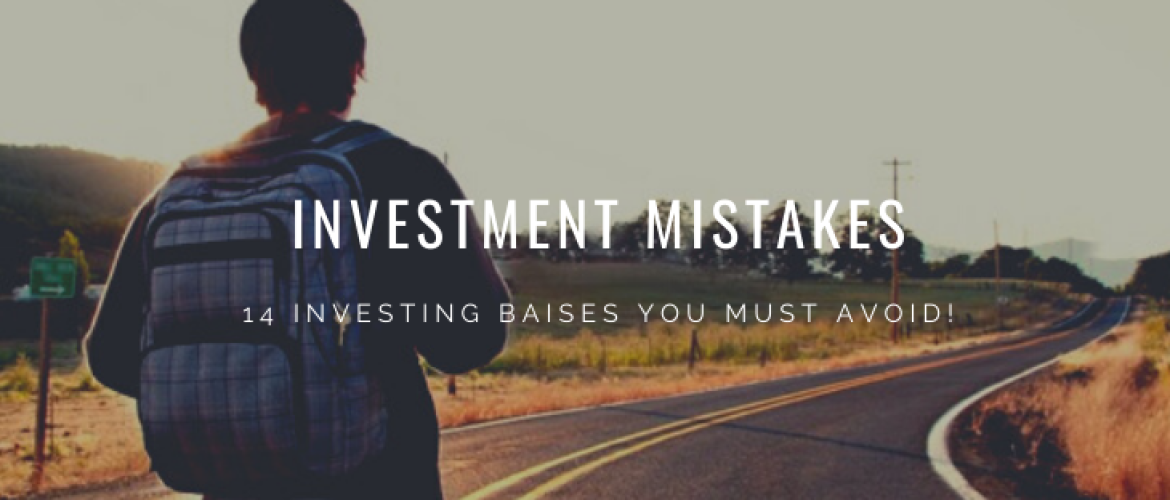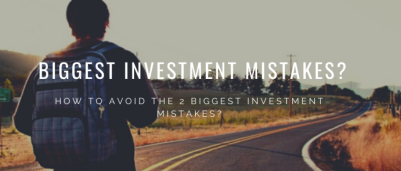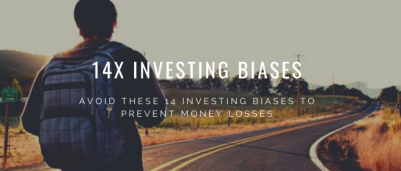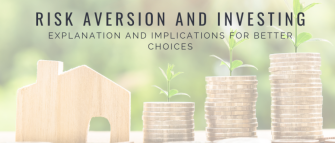Dear Happy Investors, humans and, in turn, investors are subject to biases. Consequently, you as an investor are prone to investment mistakes due to such biases. This article lists how you can improve your investment results by avoiding these investment mistakes.
The first, and main, step is being aware of these potential investment mistakes. Secondly, I provide some guidelines to avoid a bias.
A bias is a systematic tendency to deviate from rational decision-making. Thus, this article mainly lists how to act rationally under 14 common circumstances.
Contents:
Part 1 Investment Mistakes: Aversions (4)
Risk aversion
Loss aversion
Regret aversion
Disappointment aversion
Part 2 Investment Mistakes: Biases (6)
Present bias
Home bias
Herding bias
Framing bias
Probability weighting & Overconfidence
Part 3 Investment Mistakes: Effect (4)
Disposition effect
Anchoring effect
Calendar effect
Habit formation
Part 1 Investment Mistakes: Aversions (4)

Aversion is an intense feeling of repugnance toward something with a desire to avoid or turn from it.
Investment Mistake: Risk aversion
Risk aversion is our tendency to turn away from risks when possible. On the other hand, finance theory suggests that taking risks yield higher returns. This is the classical risk-return trade-off, in which risks are defined as the volatility of an investment. Hence, as an investor it might be worthwhile to take some investment risk to reach profitable gains. If you prefer a risk-free investment, then you should save in a bank account, but interest rates nowadays are near zero or even negative.
Investment Mistake: Loss aversion
The pain of losing money is psychologically about twice as powerful as the pleasure of gaining money. Unfortunately, it can be quite hard to cope with this tendency. In many situations, it helps to think about the long-term as an investor. As a result, you won’t be influenced by short-term losses. Another possibility is to make low-volatility investments, such as bonds or ETFs. A more advanced strategy is to hedge certain investments.
Investment Mistake: Regret aversion
Regret is a basic emotion, and you experience regret if you anticipate that your investment decision might turn out to be wrong in the future. Be careful with this strong emotion. Some investors hold losing investments too long or even invest more when losing, in the hope that their security recovers. As a result, you just end up losing more money than if you had just cut your investment at an earlier time.
On the other hand, buying shares lower can lead to higher returns. However, you need advanced knowledge for this, where you can value a stock by price vs. intrinsic value.
Investment Mistake: Disappointment aversion
Disappointment is the feeling of dissatisfaction that you experience when you fail to meet your investment expectations or hopes. So, avoiding disappointment is simple: set investment goals that are realistic and reachable. Don’t create overly optimistic expectations, otherwise the investment might disappoint you.
For example, an average annual return of 8% is perfectly possible if you choose a diversified investment portfolio with dividend stocks, ETFs, P2P Lending, and real estate funds.
Happy Investors Recommendation: Higher Return and Lower Risk? Tip: Asymmetrical Investing!
What if you could get higher stock returns while having less risk. Sounds too good to be true? It’s not if you know how to start with asymmetric investing. These are investments where the potential gain is greater than the potential loss. The only way for asymmetric investing is if you have a lot of knowledge and experience. This is for advanced professionals and is also used in the largest mutual funds with a minimum deposit of millions.
I’m not an expert in asymmetric investing, but I do know a very good party named Capitalist Exploits which I highly recommend. I’ve joined their Membership one year ago and it brings a lot of value for unique investment opportunities with commodities. I’m talking about +300% gains on Uranium, Copper, Agriculture, and 60+ buying opportunities. The Membership brought me a significant return on investment! These are true professionals. In addition, they also have a free newsletter where they share masterful tips and research on asymmetric investing with us once a week.
Want more information? read my full Capitalist Exploits Review and Experiences
Part 2 Investment Mistakes: Biases (6)

A bias is a tendency to evaluate situations or outcomes in a specific direction. Biases lead to the largest investment mistakes when compared to rational decision-making.
Investing Mistakes: Present bias
A present-biased investor focuses too much on the short term than the long term. We have the tendency to overvalue the present. Consequently, we neglect the future too much. The best way to avoid present bias when investing is to commit yourself to invest in the long run. You can do this by buying ETFs or, even better, by target-date funds that are specifically designed as long-term pension products.
Investing Mistakes Home bias
Home bias is the tendency to hold only modest amounts of foreign assets. In other words, investors tend to invest more in companies in their own country than in foreign countries. For this reason, you miss certain risk exposures and, thus, returns because your portfolio is not well-diversified. You can simply avoid home bias by creating a well-diversified portfolio, or by buying a pre-constructed multi-asset ETF (i.e., globally diversified over stocks, corporate bonds, government bonds, and real-estate).
For example, I find VWRL investing to be a great option for this purpose. VWRL is an ETF with over 3500 stocks worldwide. But be careful not to invest 100% of your money in VWRL. Opt for diversification, as do other ETFs and other types of investments.
Commission-free Crypto, Stocks and FOREX Trading with NAGA
Do you want to trade Bitcoin, Crypto, Stocks and Forex? NAGA is one of the biggest all-in-one crypto brokers where you can buy crypto 100% commission-free. You can also use the AutoCopy to copy the Top Traders of NAGA. In fact, you can even become a Top Trader yourself and earn up to 10.000 dollars a month if you are really good at it. Anyway, this broker is perfect for anyone who wants to trade crypto 100% commission-free. You can set up an account for free and try it out.
Want to know more? Click for more information
Investing Mistakes Herding bias
Herding is the behavior of investors that act collectively as a group without any centralized direction. Examples are stock market bubbles (collective buying) and stock market crashes (collective selling). Herding is driven by irrationality and emotion, so checking the fundamental values of your security remains key in these circumstances. Sometimes you can exploit herding behavior by acting against the market, during a stock-market crash you can buy securities or (before the crash) buy put-options for example. Be careful when you do this, you might need a lot of liquidity to make it profitable.
Investing Mistakes Framing bias
The framing effect occurs when investors make decisions based on the way information is presented, rather than on the facts themselves. It obviously sells better if the broker tells you that returns last month were +15%, rather than telling you that last year total returns were minus -5%. You simply avoid this bias by fact-checking the numbers, dates, and returns yourself.
Investing Mistakes Probability weighting & Overconfidence
The Nobel prize-winning research of Kahneman found that people overestimate small probabilities, but underestimate large probabilities. For example, an objective probability of 5% is interpreted as 15% subjectively. Don’t become too overconfident when you have a losing investment. You might hope that your security recovers and subjectively think that the recovery probability is large because you think you have superior knowledge, while based on fundamentals recovery might be low. Probability weighting and overconfidence leads us to buying lottery tickets. Statistically, the odds of winning are extremely low, but again and again people think that this time they will win.
Let Money Work for You! Starting on the best investment platforms is half the battle
Are you still working hard for your money? Why don’t you consider letting the money work for you! Create passive income and attain financial freedom. Starting on the best investment platforms is half the battle. Do you want to know what the very best investment platforms are? Then click on the blue link to compare the best investment platforms now. Here you can read my independent comparison of the best online brokers for stocks, crypto, and P2P. Save money and choose the best investment platform!
Part 3 Investment Mistakes: Effect (4)
Besides aversions and biases, there are four strong investor effects observed in financial markets. These are investment mistakes you can avoid.
Disposition effect
Investors typically hold on too long to losing investments but sell winning investments too quickly. It is extremely hard to time the market. There are two opposing ways to avoid the disposition effect as an investment mistake. In some situations, it might be worthwhile to just sell your losing investment rather than holding on, which would create even severe losses (loss aversion typically tells us to hold on). On the other hand, holding on a bit longer to a winning investment could be worthwhile as well (risk aversion pulls us to locking in gains too quickly). You should feel comfortable with the actions you take. You have already made the first step: being aware of these opposing effects.
Anchoring effect
You use a goal, such as a target number or return value, on which you fixate when you invest. This goal works as an anchor. For example, investors use the buying price unconsciously as an anchor: “I will not sell my investment lower than the buying price, let’s hold on.” While it might pay off to just sell your asset. Disappointment follows when creating unrealistic anchors.
Calendar effect
Due to behavioral biases, demand-and-supply effects, and institutional settings, the stock markets’ behavior is related to the calendar such as day of the week, time of the month or time of the year. These calendar effects have potentially large effects on your investments. For example, stocks on average typically rise in January (i.e., the January effect). So, historical data tells us that selling investment in January is profitable on average.
Habit formation
Firstly, we tend to evaluate our current performance with past performance (an anchor), since we like to be better off today than yesterday. Secondly, we tend to evaluate our investment performance with others (friends, neighbors, colleagues), since we like to be better off than them. These are the two forms of habit formation. Habits are extremely hard to break. The first step is to mindfully consider when and why you engage in a habit. Why do you want to be a better investor than any other investor? Statistically, you perform on average as everyone else. It is impossible that all investors perform above average 😉







